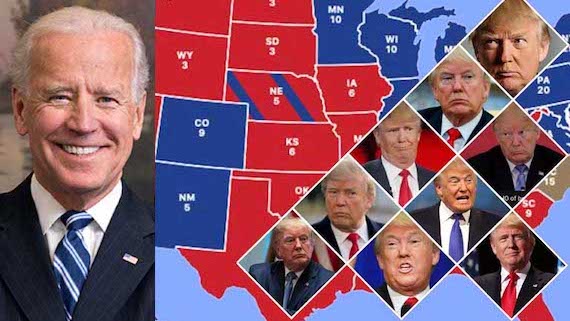This was the first election since 1992 when an incumbent president failed to win re-election for a second term. With over 75 million votes, Biden received the most votes ever cast for a presidential candidate, beating Barack Obama’s record of 69.5 million votes from 2008.
Most significantly, Joseph R Biden’s running mate Kamala Harris became the first coloured women to be elected as the Vice President of the United States.
It is apparent that despite the electoral defeat of Donald J Trump in the 59th presidential election, popular support for Trumpism has expanded.
Media analysts and pollsters are crediting Trump’s carnivalesque campaign for the enthusiastic in-person voter turnout on November 3, for presidential election 2020.
This subterranean ideology and the groups affiliated to it, even when it provided a significant proportion of the votes cast for the Republican party, is neither a part of the party nor is within its control. The coupling of alt-right with the Grand Old Party is entirely the handiwork of Trump and his acolytes.
Any analysis of the increasing fragility of polity in the US of A will be incomplete without accounting for the significant mutations in the formal political parties of the USA. Significant fault lines have emerged within both the Republican and the Democratic Party.
Since the 58th presidential election 2016, the establishment of both the Republican and Democratic party is under the threat of being swamped by a radical wing. The Democratic party is facing a mounting challenge from the left that is growing increasingly impatient with the glacial pace of socio-political and economic reforms.
Bernie Sanders and The Squad Democrats (a group of four women elected in the 2018 United States House of Representatives elections, made up of Alexandria Ocasio-Cortez of New York, Ilhan Omar of Minnesota, Ayanna Pressley of Massachusetts, and Rashida Tlaib of Michigan) have been articulating the anxieties and aspirations of the left-wing of the Democratic party. This group has already mounted two unsuccessful challenges to occupy CenterStage of Democratic party. They have also been the motivating force behind movements of police, medical and educational reforms as well as an equitable and just wage structure.
The establishment in the Republican party has already been vanquished by the alt-right challenge mounted under the leadership of Trump and Stephen Kevin Bannon. It is a symptom of this capitulation of the establishment conservatives that Abraham Lincoln’s party has lately become the vehicle for the remnants of confederate ideology in US politics.
Establishment in both the parties has displayed ineptitude in addressing this challenge. Democrats pulled defeat from the jaws of victory in the 58th presidential elections owing to the mishandling of the left-wing of their party. That the conservative establishment had some role to play in Trump’s electoral defeat is evident in the voting trends in the election of the Senate and the President in some important swing states.
Biden’s victory in Arizona and Massachusetts had the weight of the Republican supporters -late John McCain and Mitt Romney. The upshot of this challenge is that while the Democrats are increasingly being pushed towards a left-wing agenda of reforms that alt-right is pushing the Republicans towards a politics of cultural wars.
In spite of the pious enunciation of Biden, this growing chasm in US domestic politics will be hard to plaster over. In fact, the burning questions that evoked unprecedented voter turnout even in the time of pandemic can hardly be ignored by the Biden administration. However, any decisive action by the Biden administration on COVID19 related public health measures, on police reforms, especially in the face of growing sensitivity on disproportionate police action on coloured communities, on relaxations of emigration norms are all capable of igniting passions and acrimonious street wars.
The founding fathers of the United States may have visualized it as a beacon of freedom for the world, a shining city on a hill; in the current turbulent times, it may be reduced to a house on fire.
Should this concern India or the South Asian sub-continent? One must speculate the impact of a divided US on its capacity to regain the leadership of multilateral institutions in the face of the rise of China as a potential hyperpower.

